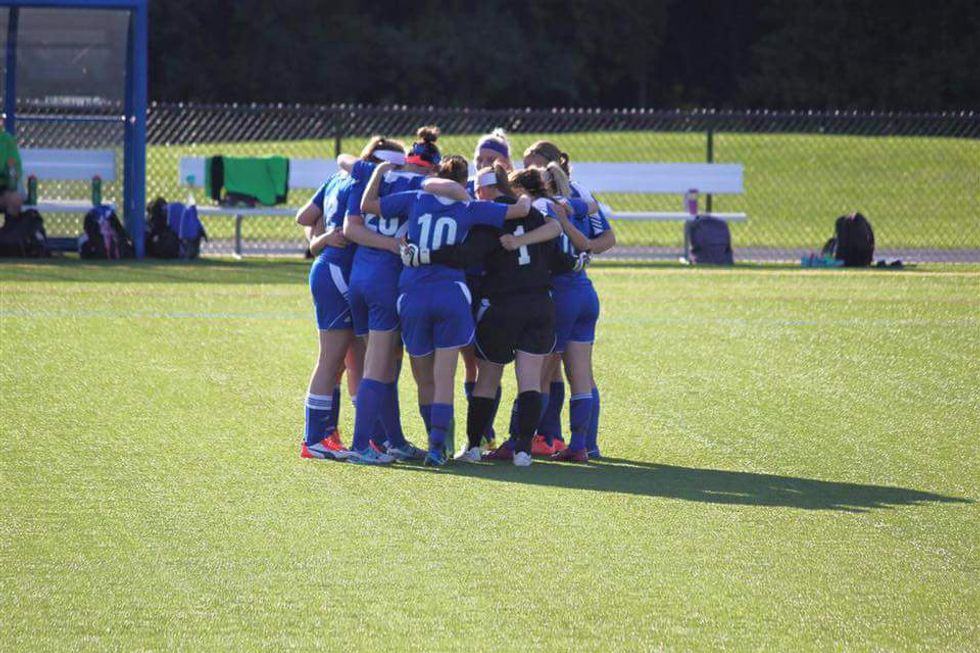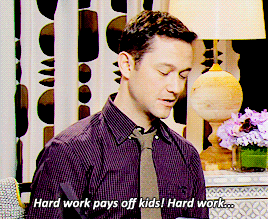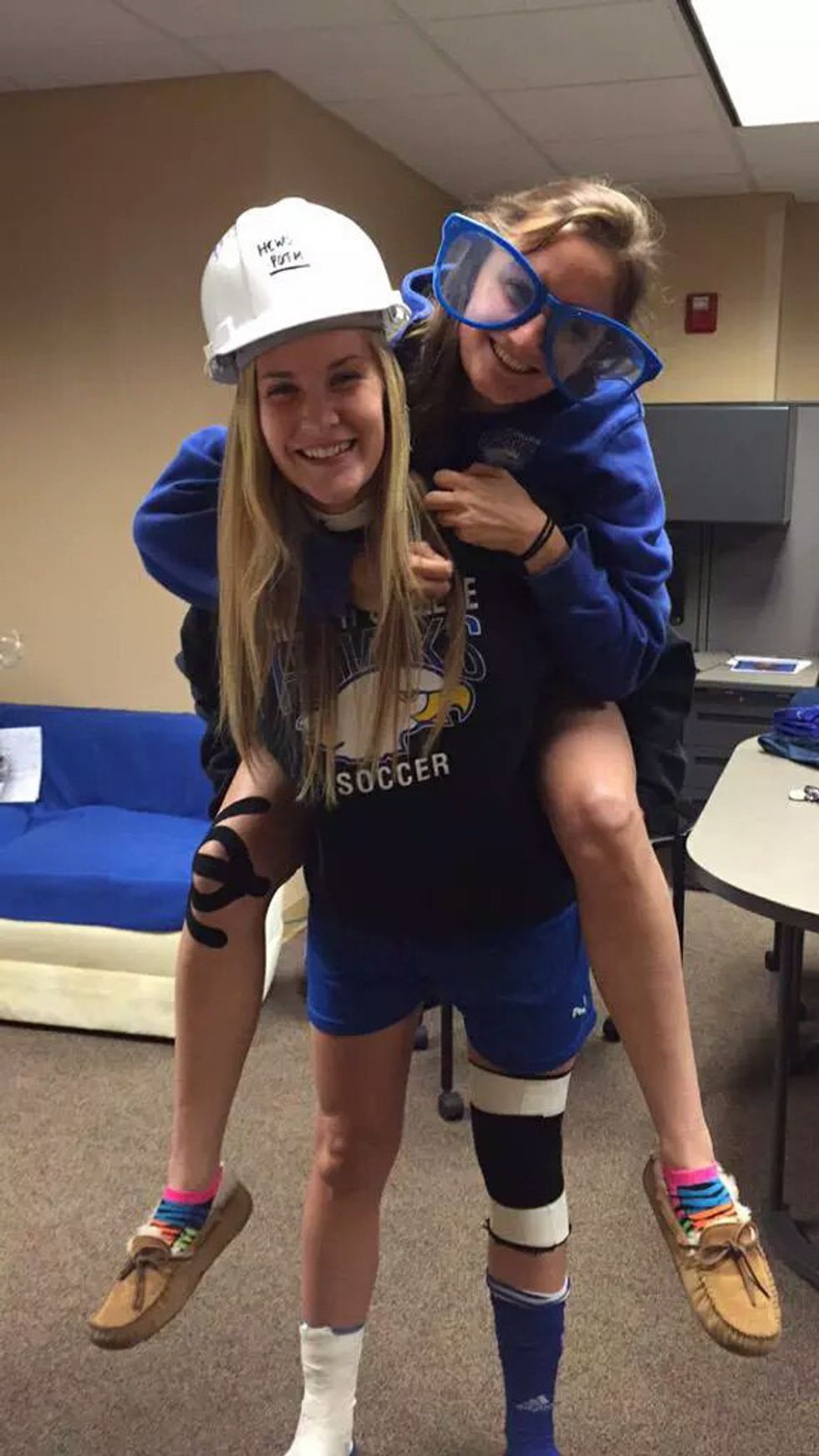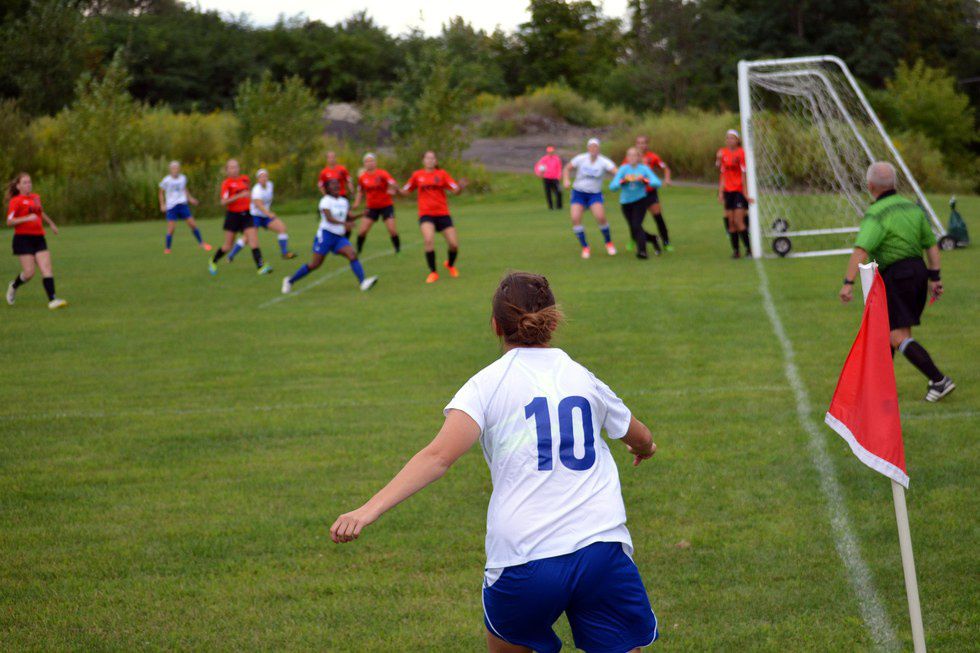For as long as I can remember, I have wanted to be a soccer player. I started playing in rec leagues when I was four years old and have no intention of stopping anytime soon. When I realized that I could continue that dream as a member of a collegiate soccer team, I literally jumped at what I consider the opportunity of a lifetime. Although the sport itself as helped me grow as a person, I would not be who I am without the numerous coaches, clubs and teammates that I have met along the way. From a very young age, athletes are taught many life lessons that shape them as players and individuals.
1. Becoming a team player.
I can still hear my first coach saying "there is no 'I' in team" at the first practice of my soccer career, without a doubt, those words have echoed in my head every time I step onto the field. Athletes learn to play as a member of the team instead of for individual glory. That lesson can be applied to not only athletics, but almost every aspect of your life.
"I am a member of a team, and I rely on the team, I defer to it and sacrifice for it, because the team, not the individual, is the ultimate champion."
2. Learning to be a leader AND a follower.
There is no doubt that at some point in your athletic career, you will change teams and be surround by different people. Each team will give someone different opportunities; sometimes to inspire and lead their teammates, other times to follow and listen to others.
You become successful by helping others become successful."
3. How to keep your emotions in check.
There will be multiple times in an athletes career where they will be faced with adversity. There will be refs, coaches, opponents and even their own team members that will frustrate, anger and annoy them. Athletes learn that expressing these emotions all of the time may not be for the best, but instead to be open to learning how to control these emotions.
"If it doesn't challenge you, it doesn't change you."
4. The importance of hard work.
As individuals grow, they realize that many successful people, whether it be athletes or everyday individuals, progressed to where they are in life by working hard and always have that proactive and progressive winning attitude. The best players are the ones who have worked the hardest to be that player by overcoming obstacles, hitting their goals and to continue to set even higher goals. That often means playing for the better teams, learning from the best coaches and doing work in the off-season. Athletes learn that there are no short cuts or "gimmes" but instead hard-work and consistency.
"If better is possible, good is not enough."
5. Setting goals AND achieving them.
Athletes learn to set goals, their first lesson and challenge is to set their first goal. Obviously to achieve something, they must figure out what they want to achieve and then how they want to achieve it. By setting and achieving goals, athletes learn the importance of perseverance and motivation and by planning on how to achieve their goals they learn to work hard.
"Work hard in silence, let success be your noise."
6. How to win gracefully and how to lose with dignity.
There is definitely a right and a wrong way to be successful in a sport and in life. Athletes should learn to be proud of themselves and their achievements without putting down their opponents. Individuals also will learn how to be on the other side even when they don't win and that disappointment cloud floods their emotions. Athletes learn to take their failures and turn them into motivation, not only to better themselves, but those around them as well.
"There are many people out there who will tell you that you can't make it. What you've got to do is turn around and say 'watch me.'"
7. Learning your strengths and weaknesses.
There is not one athlete that does not feel like they have something to improve on, they can always be better. It is important for athletes to acknowledge that there will be areas of their game that are their strengths but there will always be areas of improvement. By recognizing their strengths and weaknesses, they will learn what they should contribute to the team and what they can rely on their teammates for. Self-evaluation is important for every individual, sports related or no, for them to grow as a person.
"I learned that courage was not the absence of fear, but the triumph over it. The brave man is not he who does not feel afraid, but he who conquers that fear."
8. Dealing with stress.
Pressure and stress are present in athletics from a very young age and continues through all levels of the game. Athletics allows individuals to learn how to deal with that stress, whether it be from parents, coaches, or teammates. Whether it be a game changing foul shot, a nail-biting kick off or a nerve-wrecking penalty kick, all athletes will have moments that they might not deal with stress the right way, but they can learn and grow from each experience.
"It is when we are tested that we discover who we really are and what we can become."
9. Time Management.
As athletes get older, time has a way of going by faster. As athletes grow and commit to their sport, time management will play a major role in how their lie will basically be prioritized. Often, high school and college athletics take up your time. Athletes learn to balance their sport, school and work. Athletes learn to prioritize what is most important to them and hopefully find the time to fit everything in.
"The moment you want to quit is the moment when you need to keep pushing."
10. How to be social.
Some of the best people are members of a team. Athletes find some of their closest friends through sports. There comes an unfathomable level of camaraderie and trust being a member of a team. Granted, not every member of a team will get along with each other, but that also helps athletes deal with adversity and conflict.
"Friends pick us up when we fall down, and if they can't pick us up, they lie down and listen for a while."
11. Self-discipline.
One of the best lessons an athlete can learn is to push themselves. Athletes should want to put all of their heart into their sport and to be the best they can be. Coaches and teammates can help motivate an athlete, but it is ultimately up to the individual to push themselves to be the best they can be.
"Obstacles only become visible when you lose sight of the goal."
12. Respect.
From a very young age, athletes are taught to respect their coaches, teammates, referees and opponents. One of the first lessons on respect comes in practices, this is where individuals have to learn to not talk when someone else is talking, to shake hands with their opponents after a game and to thank the officials for their time.
"Treat others the way you want to be treated."
Being an athlete has taught me so many things and helped me grow not only as an athlete but as person taking on the real world. I have met some of the best people through athletics and have created lifelong friendships that I would never had gotten without playing the game I love.
"Somewhere behind the athlete you've become and the hours of practice and the coaches who have pushed you, is a little girl who fell in love with the game and never looked back...play for her."�






































